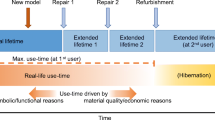Abstract
Obsolescence issues are one of the main costs in the life-cycle of sustainment-dominated systems, those that require support for many decades.
Obsolescence not only occurs when a system element becomes no longer available due to manufacturing updates or production interruption. It also includes the deterioration of the system or component capacity to operate as intended, since it is no longer suitable to fulfil its function, even if it still operates and can be manufactured and supported. As such, it also impacts on the “-ilities” (reliability, functionality, etc. …) which can be even traced to legislation changes, for instance, the anti-pollution legislation updates for automotive.
Obsolescence has so far been mainly addressed from a reactive point of view. Around 70% of the total product cost is committed as a result of decisions in the early design stages. Late changes induce delays in the life-cycle plan and large increases in cost due to re-design and rework. Knowing the impact of the conceptual design phase on life-cycle cost, this paper intends to present a model-based systems engineering approach to proactively assess obsolescence risks.
The approach uses obsolescence considerations as constraints during the early design phases, to allow the identification of components potentially at risk of obsolescence. Presenting designers with this information allows them to improve the design, by making it robust and resilient, or to accept the risk and develop an obsolescence mitigation plan.
It will be illustrated with an example from the automotive industry.
Access this chapter
Tax calculation will be finalised at checkout
Purchases are for personal use only
Similar content being viewed by others
Change history
10 November 2020
The original version of this chapter was revised. The last name of the author Sophia Salas Cordero was incorrectly tagged. Her last name has been corrected to Salas Cordero.
References
Romero Rojo, F.J., Roy, R., Shehab, E.: Obsolescence management for long-life contracts: state of the art and future trends. Int. J. Adv. Manuf. Technol. 49, 1235–1250 (2010). https://doi.org/10.1007/s00170-009-2471-3
Adams, C.: Getting a Handle on COTS Obsolescence - Avionics. https://www.aviationtoday.com/2005/05/01/getting-a-handle-on-cots-obsolescence/. Accessed 15 Jan 2020
Clarkson, P.J., Simons, C., Eckert, C.: Predicting change propagation in complex design. J. Mech. Des. 126, 788 (2004). https://doi.org/10.1115/1.1765117
Giffin, M., De Weck, O., Bounova, G., et al.: Change propagation analysis in complex technical systems. J. Mech. Des. (2009). https://doi.org/10.1115/1.3149847
Ullah, I., Tang, D., Yin, L.: Engineering change implications on product design: a review of the literature. In: Conference: International Conference on Education, Management and Computing Technology (ICEMCT 2015), pp. 1679–1691. Atlantis Press, Tianjin (2015)
Lebron, R.A., Rossi, R., Foor, W.: Risk-based COTS systems engineering assessment model: a systems engineering management tool and assessment methodology to cope with the risk of commercial off-the-shelf (COTS) technology insertion during the system life cycle (2001)
Garg, T., Eppinger, S., Joglekar, N., Olechowski, A.: Using TRLs and system architecture to estimate technology integration risk. In: Product, Services and Systems Design, pp. 301–310 (2017)
Dowling, T.: Planning for change with a holistic view of the system (2001)
Bartels, B., Ermel, U., Pecht, M., Sandborn, P.: Strategies to the Prediction, Mitigation and Management of Product Obsolescence, Wiley, Hoboken (2012)
Devereaux, J.E., Hale, P.: Obsolescence: a systems engineering and management approach for complex systems Massachusetts instift1te by of technology (2010)
Michael Ostrovsky, B., Asker, J., Bulow, J., et al.: Stability in supply chain networks. https://doi.org/10.1257/aer.98.3.897
Young, D.: New approaches to processor lifecycle management (2000)
Buratti, M., Del Brusco, D.: A strategies to mitigate obsolescence in defense systems using commercial components (2001)
INCOSE: Systems Engineering Handbook: A Guide for System Life Cycle Processes and Activities. International Council on Systems Engineering (INCOSE) (2007)
ISO/IEC/IEEE 15288:2015 - Systems and Software Engineering – System Life Cycle Processes (2015)
Brazier, F., van Langen, P., Lukosch, S., Vingerhoeds, R.: Design, engineering and governance of complex systems. Proj People – Mastering Success, pp. 34–59 (2018)
NASA: NASA Systems Engineering Handbook, SP-2016-6105 Rev2. 12th Media Services (2017)
ISO: 31000:2018 Risk management (2018)
Arroyo, I.H., Fortin, C.: Technological and complexity risk analysis for set based design evaluation. In: 2018 IEEE International Systems Engineering Symposium (ISSE), pp. 1–5. IEEE (2018)
Technology Readiness Assessment (TRA) Deskbook (2009)
Eppinger, S.D., Browning, T.R.: Design Structure Matrix Methods and Applications. MIT Press, Cambridge (2012)
Heywood, J.: Internal Combustion Engine Fundamental. McGraw Hill, New York (1988)
Author information
Authors and Affiliations
Corresponding author
Editor information
Editors and Affiliations
Rights and permissions
Copyright information
© 2020 IFIP International Federation for Information Processing
About this paper
Cite this paper
Salas Cordero, S., Vingerhoeds, R., Zolghadri, M., Baron, C. (2020). Addressing Obsolescence from Day One in the Conceptual Phase of Complex Systems as a Design Constraint. In: Nyffenegger, F., Ríos, J., Rivest, L., Bouras, A. (eds) Product Lifecycle Management Enabling Smart X. PLM 2020. IFIP Advances in Information and Communication Technology, vol 594. Springer, Cham. https://doi.org/10.1007/978-3-030-62807-9_30
Download citation
DOI: https://doi.org/10.1007/978-3-030-62807-9_30
Published:
Publisher Name: Springer, Cham
Print ISBN: 978-3-030-62806-2
Online ISBN: 978-3-030-62807-9
eBook Packages: Computer ScienceComputer Science (R0)





